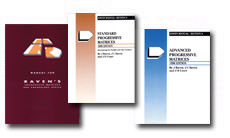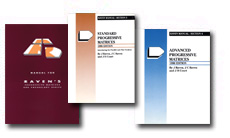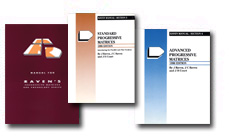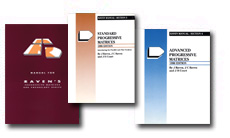Advanced Progressive Matrices (APM) The APM is the most difficult version of the progressive matrices and was designed to assess high level non-verbal reasoning abilities, and to enable assessment of the speed of accurate intellectual work. The APM is widely used in the areas of gifted education, management selection, and research. It contains 12 familiarisation problems (Set I) and 36 test items (Set II) arranged in order of increasing difficulty. | ||||
Standard Progressive Matrices (SPM) The SPM was designed to assess non-verbal reasoning in the general population. It contains 60 items divided into 5 sets of 12. The SPM is used widely in clinical, educational, occupational and research settings. Three versions of the test are available: • Classic: original form • Parallel: alternate form for use in re-testing • Plus: a more difficult version designed to restore the discriminative power of the test by spreading the top scores more effectively | ||||
Coloured Progressive Matrices (CPM) The CPM contains 36 items derived from the easiest subtests of the SPM and is designed to assess nonverbal reasoning in children, the elderly, and persons with intellectual disabilities. The CPM is used widely in clinical, educational, neuropsychological and research settings. Both a classic and a parallel version are available for re-testing. | ||||
Australian Standardisation Project In 2008 Harcourt Assessment will be undertaking an Australian Standardisation project for the Raven’s Progressive Matrices. More information on this exciting development will become available throughout the year. Introducing Raven’s Progressive Matrices and Vocabulary Scales Raven’s Progressive Matrices are widely regarded as the world’s leading tool for measuring fluid intelligence – the innate problem-solving ability that makes sense and meaning out of complex or confusing data. When used together with Raven’s Vocabulary Scales it is possible to quickly assess the two components of ‘g’ or general intelligence identified as fluid and crystallised intelligence – providing one of the best measures of general cognitive ability available. Measuring Fluid Intelligence with Ravens Raven’s Progressive Matrices measure fluid intelligence (educative ability) – the ability to make sense out of complex data, the ability to perceive new patterns and relationships and to forge (largely non-verbal) constructs. The Matrices are available in three formats; • Coloured Progressive Matrices (CPM) – for use with children up to 11 years old or clients with special needs • Advanced Progressive Matrices (APM) – top 20% of the population and especially useful for management selection • Measuring Crystallised Intelligence with Ravens Progressive Matrices scores can be supplemented by using Raven’s Vocabulary Scales to also measure crystallised intelligence (or reproductive ability)- the ability to store, process and utilise a culture’s store of (largely verbal) information and knowledge. Though these two abilities frequently work in tandem, they are very different from each other and many occupational, educational and clinical settings require both to be assessed and interpreted.
| ||||






